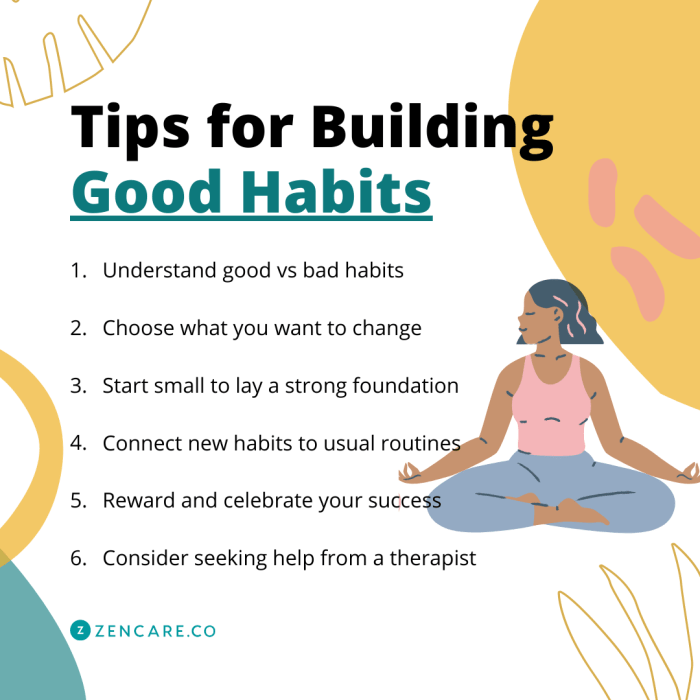Building Healthy Habits takes center stage in this guide, inviting you into a world of well-being and self-improvement. Get ready to dive into a journey that will transform your lifestyle and elevate your overall health game.
From fitness to nutrition and mental well-being, this is your ultimate roadmap to crafting a life filled with positivity and longevity.
Importance of Building Healthy Habits

Building healthy habits is crucial for overall well-being as it plays a significant role in maintaining physical, mental, and emotional health. By incorporating healthy habits into our daily routine, we can improve our quality of life and reduce the risk of various health issues.
Examples of Positive Impact
- Regular exercise can boost energy levels, improve mood, and reduce the risk of chronic diseases like heart disease and diabetes.
- Eating a balanced diet rich in fruits, vegetables, and whole grains can enhance overall health and support proper functioning of the body.
- Getting an adequate amount of sleep each night can improve cognitive function, mood regulation, and immune system function.
Long-Term Benefits
- Building healthy habits can lead to increased longevity and a higher quality of life as we age.
- Consistent exercise and healthy eating can help maintain a healthy weight and reduce the risk of obesity-related conditions.
- Practicing stress-reducing techniques like meditation or yoga can improve mental health and overall well-being over time.
Types of Healthy Habits to Develop

Developing healthy habits is crucial for overall well-being. It’s not just about hitting the gym or eating salads; it’s about incorporating a variety of habits that promote physical, mental, and emotional health. Here are some key categories of healthy habits to consider:
Physical Activity
Regular exercise is essential for maintaining a healthy body and mind. Whether it’s going for a run, hitting the weights, or practicing yoga, finding a physical activity you enjoy can make a big difference in your overall health.
Nutrition
Eating a balanced diet rich in fruits, vegetables, whole grains, and lean proteins is key to fueling your body with the nutrients it needs to function optimally. Avoiding processed foods and sugary drinks can also have a significant impact on your health.
Mental Well-being
Taking care of your mental health is just as important as taking care of your physical health. Practices like mindfulness meditation, journaling, and seeking therapy can help you manage stress, anxiety, and other mental health challenges.
Self-Care, Building Healthy Habits
Self-care habits such as getting enough sleep, staying hydrated, and taking time for yourself are essential for maintaining a healthy lifestyle. Prioritizing self-care can improve your overall well-being and prevent burnout.
Social Connections
Building and nurturing relationships with friends, family, and community members can have a positive impact on your mental and emotional health. Connecting with others can provide support, reduce feelings of loneliness, and increase feelings of happiness and fulfillment.
Incorporating a variety of healthy habits from different categories can help create a balanced lifestyle that promotes overall well-being. By focusing on physical activity, nutrition, mental well-being, self-care, and social connections, you can cultivate a healthy routine that supports your physical, emotional, and mental health.
Strategies for Establishing Healthy Habits: Building Healthy Habits
To start building healthy habits, it’s essential to take a step-by-step approach. Setting realistic goals and being consistent are key factors in maintaining these habits long term.
Step-by-Step Guidance
- Start small: Begin by incorporating one healthy habit at a time to avoid feeling overwhelmed.
- Set specific goals: Define exactly what you want to achieve with your new habit.
- Create a routine: Establish a daily or weekly schedule to help reinforce the habit.
- Track your progress: Keep a journal or use an app to monitor how well you are sticking to your new habit.
Setting Realistic Goals
- Be specific: Instead of saying “I want to eat healthier,” set a goal like “I will eat a serving of vegetables with every meal.”
- Make it measurable: Set targets that you can track, such as exercising for 30 minutes three times a week.
- Be realistic: Start with goals that are challenging but achievable to build confidence and momentum.
- Adjust as needed: Don’t be afraid to modify your goals if they are too easy or too difficult.
Importance of Consistency
- Consistency is key: Regularly practicing a healthy habit helps solidify it into your routine.
- Build momentum: The more consistent you are, the easier it becomes to maintain the habit over time.
- Stay motivated: Celebrate your successes and use setbacks as learning opportunities to stay on track.
Overcoming Challenges in Building Healthy Habits
In the journey of building healthy habits, individuals often face various challenges that can hinder their progress. It is important to identify these obstacles and implement strategies to overcome them in order to stay motivated and committed to a healthier lifestyle.
Identifying Common Obstacles
- Time constraints: Busy schedules and other commitments can make it difficult to prioritize healthy habits.
- Lack of motivation: Feeling demotivated or uninspired can prevent individuals from sticking to their healthy routines.
- Unsupportive environment: Surroundings that do not promote healthy habits can make it challenging to stay on track.
Strategies for Overcoming Procrastination
- Break tasks down: Divide larger goals into smaller, manageable steps to avoid feeling overwhelmed.
- Set deadlines: Establish specific deadlines for each task to create a sense of urgency and accountability.
- Reward yourself: Celebrate small victories along the way to stay motivated and incentivize progress.
Navigating Setbacks and Continuing Progress
- Reflect on setbacks: Analyze what went wrong and learn from mistakes to prevent similar challenges in the future.
- Stay positive: Maintain a positive attitude and focus on the progress made rather than dwelling on setbacks.
- Seek support: Surround yourself with individuals who can provide encouragement and guidance during difficult times.
Creating a Supportive Environment for Healthy Habits
In order to successfully build and maintain healthy habits, it is crucial to create a supportive environment that encourages positive behaviors and lifestyle changes. This supportive environment can come from social support, involvement of friends and family, and consideration of environmental factors.
Role of Social Support
Social support plays a significant role in maintaining healthy habits. Having a network of supportive friends, family members, or even online communities can provide encouragement, accountability, and motivation to stay on track with your healthy habits. Surrounding yourself with people who share similar goals can foster a sense of community and make the journey towards a healthier lifestyle more enjoyable.
Involving Friends and Family
– Share your goals and progress with your friends and family members to keep them informed and involved in your journey.
– Invite friends or family to join you in physical activities or healthy meals to make the process more fun and engaging.
– Seek support and encouragement from loved ones during challenging times or moments of temptation.
– Encourage open communication about your goals and provide opportunities for your friends and family to offer suggestions or help when needed.
Impact of Environmental Factors
Environmental factors, such as access to healthy food options, availability of exercise facilities, and the overall atmosphere of your surroundings, can greatly influence habit formation and maintenance. By creating an environment that is conducive to healthy choices, you are more likely to stick to your habits and achieve long-term success. Consider making small changes to your surroundings, such as keeping healthy snacks on hand or finding new workout spots, to support your journey towards a healthier lifestyle.
